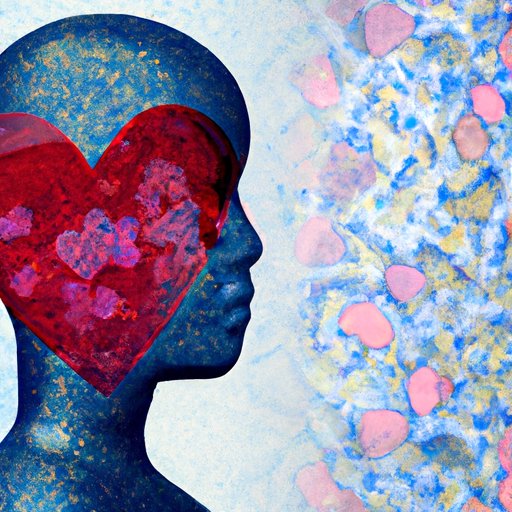Introduction
Falling in love is a universal experience that has been immortalized in literature, art, music, and film. It’s something we all strive for, but it’s also a complex phenomenon that has baffled scientists, psychologists, philosophers, and theologians for centuries. In this article, we will explore the reasons why we fall in love, drawing on scientific explanations, cultural factors, personal experiences, emotional connections, psychological perspectives, and evolutionary biology. By the end of this article, you’ll have a better understanding of why falling in love is a universal but mysterious experience that can change your life.
Scientific Explanation
From a scientific standpoint, falling in love can be defined as a neurological condition. When we’re in love, our brain releases a cocktail of chemicals, including dopamine, oxytocin, serotonin, and adrenaline. These chemicals create feelings of euphoria, pleasure, and excitement, which contribute to the emotional high that we associate with falling in love.
At a biological level, falling in love serves an evolutionary purpose. It’s a mechanism that ensures the survival of our genes by motivating us to seek out suitable partners and reproduce. This can be seen in the way we are attracted to physically attractive people who appear healthy and fertile. Additionally, we tend to be attracted to people who have different immune systems than our own, further enhancing our chances of producing healthy offspring.
On a psychological level, falling in love can be seen as an attachment process. We are drawn to people who can provide us with a sense of security, comfort, and companionship. This need for connection is rooted in our earliest experiences of bonding with our parents or caregivers and is shaped by our attachment style, which can be either secure or insecure.
Cultural Factors
While the biological and psychological reasons for falling in love are universal, the way we approach romantic relationships is heavily influenced by cultural factors. Different societies have different attitudes towards love, marriage, and sexuality, which shape our expectations and behaviors.
For example, in traditional societies, arranged marriages are common, and romantic love may not be considered a necessary component of a successful marriage. In contrast, Western societies tend to prioritize romantic love as the essential foundation for marriage and family life.
Cultural factors also impact how people approach dating and relationships. In some societies, casual dating is frowned upon, and individuals may be expected to enter into serious relationships only after a certain age or stage in life. In other cultures, dating may be seen as more casual and experimental, and people may be more open to exploring different relationships before settling down.
Personal Experiences
Personal experiences of falling in love can vary widely. Some people report experiencing love at first sight, while others describe a gradual process of getting to know someone and discovering a connection over time.
Psychotherapy experts suggest that the experience of falling in love can be influenced by factors such as attachment style, past relationship experiences, and personal values and beliefs.
For example, someone with an anxious attachment style may be more likely to experience intense feelings of infatuation and worry about the stability of the relationship. Someone with a secure attachment style may be more likely to experience a sense of ease and comfort in their relationships.
Emotional Connection
The emotional connection between two people is a crucial component of falling in love. When we fall in love, we often feel a deep sense of connection with our partner, a feeling that we are seen, heard, and understood.
This emotional connection is built through a process of mutual vulnerability, as both partners share intimate details about their lives, thoughts, and feelings. This vulnerability creates a sense of trust and intimacy, allowing for a deeper emotional bond to form.
In a healthy relationship, this emotional connection can provide a sense of security, comfort, and companionship. It can also bring a range of emotional rewards, including feelings of joy, contentment, and happiness.
Psychological Perspectives
Renowned psychologists such as Freud, Jung, and Maslow have all offered insights into the reasons why we fall in love.
Freud suggested that love was a result of unresolved childhood conflicts and that falling in love was an attempt to re-create the dynamics of early family relationships.
Jung suggested that falling in love was a result of the unconscious mind seeking to balance its masculine and feminine aspects. He argued that the process of falling in love involves projecting our own unconscious desires onto another person.
Maslow suggested that love was a result of our innate need for self-actualization. He proposed that falling in love represented a desire to merge with another person and to experience a sense of transcendence beyond the self.
Evolutionary Biology
The concept of love has evolved over time, and so have our genetic predispositions for selecting partners. Evolutionary biologists have identified several factors that have influenced the evolution of romantic attraction.
For example, in prehistoric times, physical attractiveness was a crucial factor in selecting a mate. This was because physical attractiveness was seen as a sign of good health and fertility.
Today, however, our cultural and social environment has expanded our criteria for selecting a mate. We now tend to prioritize personality traits, shared values and interests, and emotional connection when selecting a partner.
Conclusion
In conclusion, falling in love is a universal but complex phenomenon that is shaped by a range of factors, including biology, psychology, culture, personal experiences, emotional connections, psychological perspectives, and evolutionary biology.
While we can’t control when and how we fall in love, understanding the reasons behind it can help us navigate the challenges and rewards of romantic relationships.
For those struggling to fall in love, it’s essential to focus on developing a secure attachment style, building emotional connections, and being open to different types of relationships.
